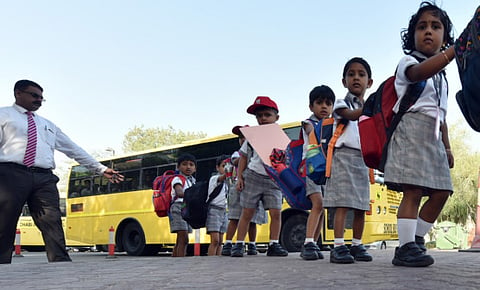Coronavirus: Abu Dhabi schools may offer fee discounts and learning support
Adek instructs schools to ease remote learning burden on students, parents and teachers

Abu Dhabi: Following UAE-wide directives to suspend in-class learning until June, school leaders in Abu Dhabi have been instructed to ease the transition for parents and ease financial burdens on families whenever possible.
In a memo seen by Gulf News, education regulator, the Abu Dhabi Department of Education and Knowledge (Adek) yesterday confirmed the continuation of remote or distance learning for the next three months.
“As per ministerial decree, distance learning is now legislated and will continue until the end of the academic year 2019-2020 for foreign curriculum private schools, and the end of term 1 for Asian curriculum schools. The respective terms will officially start on 5 April 2020,” the memo states.
The decision was announced on Monday as a measure to limit the coronavirus outbreak in the country, and will affect more than 400 public and private schools in Abu Dhabi emirate.
Fee payment discounts advised
While allowing schools to collect tuition fees for the next term, Adek has advised them to offer refunds wherever possible, as well as discounts on tuition.
“Schools should refund transportation for Term 3 and other related fees, when possible. Schools are [also] strongly encouraged to give parents a discount on tuition fees. Please explore ways of saving on costs that you can pass on as savings to parents. This discount can be activated through a credit for their tuition fees for the [term],” the Adek advised, adding that the gesture would “go a long way in showing goodwill and commitment to parents”.
In the case of parents who are facing difficulties settling dues to the schools, schools have been recommended to set up payment schemes.
“Parents who have been adversely affective during this situation, [either because] they lost their employment or have been forced to take unpaid leave, might ace difficulties in settling fees. These families should not be affected negatively. We recommend developing a payment facilitation scheme for these families. Please [also] collect documentation regarding their circumstances,” the memo reads.
In order to handle fee-related concerns, each school must therefore assign a dedicated person who also tracks parental suggestions and complaints.
“The next few weeks will be crucial in how you handle parental concerns regarding the payment of tuition fees. We require your full engagement with parents to secure their support and compliance with the upcoming payment,” Adek has said.
Staff salaries
As schools continue to collect fees, they have also been urged to avoid pay cuts for teachers.
“Teachers are working diligently during this time and we strongly encourage against pay cuts as this will affect your ability to retain them past this crisis,” the Adek has advised.
Still, schools can amicably explore ways to reach “a mutually acceptable agreement under extenuating circumstances”.
Meanwhile, non-teaching staff whose services are not required during this time can be given temporary pay cuts if needed.
“Please bear in mind that they may be supporting other families; it’s important we maintain our ethical standards during this difficult time,” the memo added.
Continuity of learning
Institutions must also set up specific policies and strategies to ensure that children can continue learning even as they stay home.
These policies must monitor attendance for students and teachers, enable assessment and grading for the term, provide ongoing feedback to students on schoolwork, maintain electronic platforms that allow student-teacher-parent interactions, and respond to parental concerns and challenges.
Students who struggle with the new processes must also be supported, including those with additional or special needs, and parents who are feeling overwhelmed with remote learning must be helped.
Additionally, teachers must continue to receive sufficient professional development and training to use digital learning platforms, and schools must also check on staff to ensure they are able to cope with the requirements of remote learning.
Public schools in Abu Dhabi follow the UAE Ministry of Education (MoE) curriculum. The majority of children are however enrolled in private schools, which offer 15 different curriculums, including British, American, Indian, International Baccalaureate, MoE and Pakistani.
Earlier this week, private education provider GEMS announced that it will not collect bus fees for April onwards, and until school recommences, and that it will advance any paid fees for the future.







